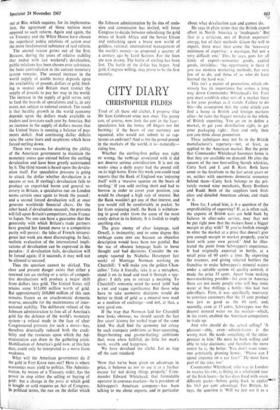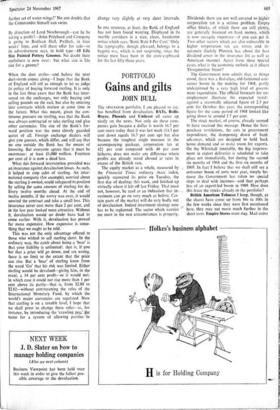CITY DIARY
CHRISTOPHER FILDES
Tired of all these old clichés, I propose (like Mr Sam Goldwyn) some new ones. The penny can, of course, now look the cent in the face: speculators lick the honey off fingers not for burning: if the bears of our currency are squeezed, who would not submit to so rap- turous an embrace? And as for the proud pound in the markets of the world, it is—naturally- riding low.
Whether the sterling-first policy was right or wrong, the verbiage associated with it did not deserve serious consideration. It is not six weeks since a daily paper had the pound still on its high horse. Even this week you could read reports that the Bank of England was 'enjoying itself' with a 'massive squeeze on the bears of sterling.' If you sold sterling short and had to borrow in order to cover your position, you would be charged a high rate of interest. But the Bank wouldn't get any of that interest, and you would still be comfortably in pocket. So far from enjoying itself, the Bank is withdraw- ing in good order from the scene of the most costly defeat in its history. It is foolish to imply anything else.
The great enemy of clear language, said Orwell, is insincerity; and to some degree this verbiage came into use because an objective description would have been too painful. But the use of obscure language leads to loose thought and bad decisions. Consider the ex- ample (quoted by Nicholas Davenport last week) of Montagu Norman working on Churchill: 'I will make you the golden Chan- cellor.' Take it literally, take it as a metaphor, stand it on its head and read it through a spy- glass: I defy you to extract a meaning. To Churchill's romantic mind the word 'gold' had a vast and vague significance. But those who have to take economic decisions would do better to think of gold as a mineral now used as a medium of exchange—and not, at that, a very good one.
If the trap that Norman laid for Churchill now looks obvious, we should search the last few years' history for verbal traps of the same kind. We shall find the economy led astray by such trumpery ambitions as bear-squeezing, finger-burning and gnome-baiting; ambitions that, even when fulfilled, do little for man's work, wealth and happiness.
We have devalued the cliché. Let us stay off the cant standard.
'Now that we've been given an advantage in price, it behoves us not to use it as a further excuse for not doing things properly.' Com- mander Edward Whitehead, that formidable operator in overseas markets—he is president of Schweppes's American company—has been talking to me about exports, and in particular about what devaluation can and cannot do.
He says in plain terms that the British export effort in North America is 'inadequate.' But that is a criticism, not of British exporters' energy, but of their methods. Given the will to export, there must then come the 'necessary minimum of expertise: a mystique, but not a very difficult one.' This, he says, goes for all kinds of export—consumer goods, capital goods, invisibles : 'the opportunity is there if you use modern marketing methods; but very few of us do, and those of us who do have learned the hard way.'
This isn't a matter of promotion, which ob- viously has its importance but comes a long way down Commander Whitehead's list. First you must establish what sort of a market there is for your product as it stands. Failure to do this—the assumption that the same article can find a home in British and foreign markets alike—he rates the biggest mistake in the whole of British exporting. You go on to define a market, to get your distribution right, to get your packaging right: then and only then can you think about promotion.
These techniques may not be in the British manufacturer's repertory—not, at least, as applied to the American market. But the point that Commander Whitehead hammers home is that they are available on demand. He cites the success of the two best-selling Scotch whiskies, Cutty Sark and J. and B. Rare. Both have come to the forefront in the last seven years or so, neither with enormous domestic resources behind them--Cutty Sark belongs to the pri- vately owned wine merchants, Berry Brothers and Rudd. Both of the suppliers took firs:- class and detailed American advice, and stuck to it.
How far, I asked him, is it a question of the unprofitability of exporting? If, as is often said, the exports of British cars are held back by failures in after-sales service, may that not be put right now that the makers have a bigger margin to play with? 'If you're foolish enough to enter the market at a price that doesn't give you enough margin to market properly, you're hoist with your own petard.' And he illus- trated the point from Schweppes's experience. It had originally exported in bottle, at a retail price of 60 cents a time. By exporting the essences, and giving selected bottlers the franchise to make Schweppes's mineral waters under a suitable system of quality control, it made the price 15 cents. Apart from making mass-marketing possible—for even in America there are not many people who will buy tonic water at five shillings a bottle—this had two side-effects. First, it was specifically necessary to convince customers that the 15 cent product was just as good as the 60 cent; and, secondly, even at 15 cents, Schweppes was the dearest mineral water on the market—which, in the event, enabled the American competitors to trade up.
And who should do the actual selling? 'A pleasant—able, even—administrator is the wrong man. He needs something of the entre- preneur in him.' He must be both willing and able to take decisions; and therefore the more senior he is, the better. 'You don't want some- one constantly phoning home : "Please can 1 spend sixpence on a car fare?" He must have part of the take, too.'
Commander Whitehead, who was in London to receive his CBE, is fitting in a whirlwind tour of the Irish hunts—he has days fixed with seven different packs—before going back to exploit' his 14.3 per cent advantage. For Britain, he says, the question is 'Will we just use it as a
further set of water-wings?' No one doubts that the Commander himself can swim.
By direction of Lord Newborough—can he be taking a profit?—John Pritchard and Company is going to Bodfean Hall, Pwllheli, in four weeks' time, and will there offer for sale—so its advertisement says, in bold type—IS Life Size Painted Pottery Gnomes. No doubt their usefulness is now over: but what size is life size for a gnome?
When the dust settles—and before the next dust-storm comes along—I hope that the Bank of England will tell us enough to let us judge its policy of buying forward sterling. It is only in the last three- years that the Bank has inter- vened on the exchanges, not only buying and selling pounds on the nail, but also by entering into contracts which mature at some time in the future. What this meant, given the con- tinuous pressure on sterling, was that the Bank was always contracted to take sterling and give other currencies. The size of the Bank's for- ward position was the most closely guarded secret of all. Foreign exchange dealers will give you guesses, which differ, and will say that no one outside the Bank has the means of knowing. But everyone agrees that it must be enormous: at least £1,000 million. Fourteen per cent of it is now a dead loss.
What this forward intervention provided.was an insurance against devaluation losses. As such, it helped to stop sales of sterling. An inter- national company (for example), worried about the sterling it owned, could safeguard its position by selling the same amount of sterling for de- livery twelve months ahead. At the end of twelve months, if the worry was over, it would unwind the contract and take a small loss. This insurance never cost more than 2 per cent, and in the last year looked most attractive. Without it, devaluation would no doubt have had to come earlier. With it, devaluation has proved far more expensive. How expensive is some- thing that we ought to be told.
This was not the only advantage offered to those who wished to sell sterling short. In the ordinary way, the catch about being a `bear' is that your liability is unlimited: that is, if you bet that a price will go down, and are wrong, there is no limit to the extent that the price can rise. But a 'bear' of sterling knew from the word `Go' that his risk was limited. Either sterling would be devalued—giving him, in the event, a 14 per cent profit—or it would not; in which case it could not rise more than 1 per cent above its parity—that is, from $2.80 to $2.82—without contravening the rules of the International Monetary Fund, by which the world's major currencies are regulated. Now that sterling is on a tenable level, I hope that we shall press to change these rules—as, for instance, by introducing the 'crawling peg; to name for a system of allowing parities to
change very slightly at very short intervals.
In one resource, at least, the Bank of England has not been found wanting. Displayed in its marble corridors is a nice, clean, handsome notice which says, 'Bank Rate 8 Per Cent.' Only the typography, though pleasant, belongs to a bygone era; which is not surprising, since the notice must have been in the store-cupboard for the last fifty-three years.















































 Previous page
Previous page